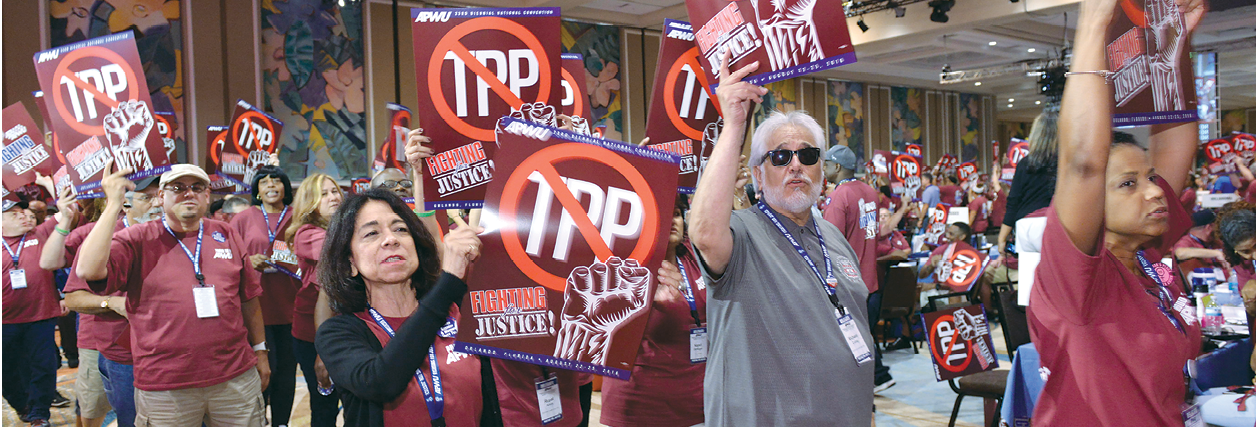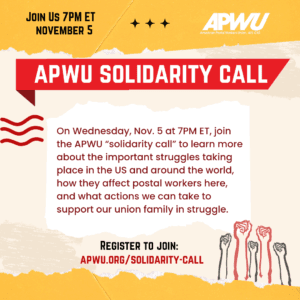September 15, 2016
Report: TPP Will Challenge Public Postal Services
Congress Could Vote on Deal in Lame-Duck Session

(This article first appeared in the September-October 2016 issue of The American Postal Worker magazine)
The Trans-Pacific Partnership (TPP), a trade deal being negotiated behind closed doors between the U.S., Canada and 10 other countries, is facing stiff opposition from the labor movement, environmental activists and many others. A spirited rally at the union’s National Convention in August took aim at the trade deal.
Despite the fierce opposition, the White House and Republican-controlled Congress are continuing to promote the secret deal.
Opponents believe Congress may consider the TPP in the lame-duck session – after the November elections but before newly elected senators and representatives take office.
Unions and other organizations are urging their members to ask their U.S. senators and representatives to oppose the deal – whenever it comes up for vote. Call the Capitol Hill switchboard at (202) 224-3121 to urge your members of Congress to vote against the TPP. A two-minute video by Robert Reich, the former Secretary of Labor, explains the objections to the trade deal in layman’s terms. The Worst Trade Deal You’ve Never Heard Of can be viewed on YouTube and on the APWU’s Facebook page, Facebook.com/APWUnational.
“Big corporations and Wall Street get an international tribunal of private attorneys, outside any nation’s legal system, that can order compensation of any lost profits found as a result of national regulations,” Reich points out. “U.S. corporations can challenge any U.S. government regulation they claim unfairly diminished their profits. This means that laws that protect consumers and workers could be overturned.”
A Threat to Public Postal Services
This summer, Canadian lawyers Daniel Sheppard and Louis Century published a report, Signed, Sealed and Delivered? The TPP and Canada’s Public Postal Service, which confirms the suspicions of postal unions: TPP regulations could severely weaken public postal services.
Although the report focuses on the effect the deal would have on Canada, its conclusions apply to the U.S. Postal Service and the post offices of other participating nations as well.
The TPP includes several rules targeting postal services that were included at the request of private delivery companies, such as UPS and FedEx.
The report by the lawyers notes, “The TPP’s convoluted, overlapping and ambiguous rules, many of which directly respond to industry lobbying, create real risks of future trade and investment disputes triggered by corporations or member states unhappy with Canada’s [and the United States’ and other countries’] policy choices in the area of postal services.”
“The trade deal does create serious economic challenges for Canada Post [and the USPS] by threatening its ability to perform profitable, non-core services that help make letter mail delivery more economically feasible,” it says. “It is these economic challenges that should concern anyone who wishes to see Canada [and the U.S.] maintain a viable, universal, public postal service across the country.”
While the TPP does not directly call for the privatization of Canada Post or the U.S. Postal Service, it does expand on trade deals that already benefit private delivery services.
The report also notes that these provisions are far more extensive than similar rules in existing trade agreements, such as NAFTA.
“Legal interpretations aside, the TPP is a powerful tool that can and will be used by companies to lobby against, and potentially challenge, Canada Post initiatives that cut into their bottom line,” the report concludes.



